 R. Gerry Fabian is a retired English instructor. He has been publishing poetry since 1972 in various poetry magazines. His web page is https://rgerryfabian.wordpress.com He is the editor of Raw Dog Press https://rawdogpress.wordpress.com His novels, Memphis Masquerade , Getting Lucky (The Story) and published poetry book, Parallels are available at Smashwords and all other ebook stores. Chasing Angels I have been beyond the forbidden hours. Very few go there; fewer return. I have been there more than once. I do not regret it. I will go back, again. Cold Chowder All the ingredients are properly prepared. Clams shucked; onions, celery, carrots cut and cubed; flour, butter and cream whisked thick and smooth. Simmered yet never boiled. The only item missing is you. Self Help Make friends so you may shape the oddities that are YOU into the smiles of faces which speak your name so easily as their own. Make friends who will help you unwrap the tight packages that go beyond your design.
2 Comments
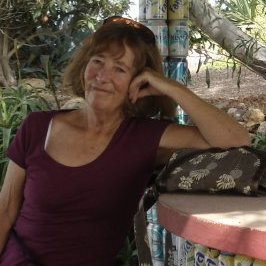 Lynn White lives in north Wales. Her work is influenced by issues of social justice and events, places and people she has known or imagined. She is especially interested in exploring the boundaries of dream, fantasy and reality. Her poem 'A Rose For Gaza' was shortlisted for the Theatre Cloud 'War Poetry for Today' competition 2014. This and many other poems, have been widely published, in recent anthologies such as - ‘Alice In Wonderland’ by Silver Birch Press, ‘The Border Crossed Us’ from Vagabond Press and ‘Selfhood’ from Trancendence Zero - and journals such as Apogee, Firewords Quarterly, Indie Soleil, Midnight Circus and Snapdragon as well as many other online and print publications. Find Lynn at: https://www.facebook.com/pages/Lynn-White-Poetry/1603675983213077?fref=ts and lynnwhitepoetry.blogspot.com Suffocating I am being suffocated by this society, pushed into a corner until I can't breath any more. Pressed up against the other screamers, the can't breathers. Crying out. I am not being suffocated under the weight of immigration. Or even the armlocks and bullets of police out of control. No, I am being suffocated by the vile venom of normality or what has come to pass for it. By indifference, by dishonesty, by power used to abuse. What will it take for us to learn how to distort this normality, how to smother this sickness and heal us all. The Driving Instructor I needed rather a lot of driving lessons. My lack of a sense of direction didn’t help. Nor, did my occasional confusion between right and left. But, coming up to my test, my new instructor was sympathetic. We could go for a Sunday drive, he said. I could have a free lesson and maybe a drink after. Well, why not? He told me a story over the drink. He’d been in the war in Singapore. Such horror. And conscripts all. In the chaos an enemy soldier had shot his dog. Shot her. Killed her, dead. Such horror. And conscripts all. But, it was alright in the end, he’d ‘got’ the one who did it. ‘Got him.’ Shot him! Killed him, dead. Such horror. And conscripts all. The life of a man for the life of a dog. Both shot. Both killed. Both dead. It was the life of the man I valued most. And I said so using a lot of words. Yes, rather a lot of words loudly spoken. So no more free lessons, but I passed my test. First published in Silver Birch Press, Learning To Drive Series, May 2016 Desolate Road It’s a long and desolate road. I think it’s always been so. Such a desolate road to travel before I see the brightness ahead, the light after desolation reflected in the water of the lake, And the wire fence is no barrier to this vision of my future brightness. And the gate looks open ready to welcome me through. Sometimes a gate has seemed closed, only to open with a degree of pressure to allow me through. Sometimes it has stayed closed set firmly against me. But this one is seems open, or partly open, no barrier to my passing. But as I draw closer I can see the chain and the padlock. Open so far, but no further. I can go so far, but no further along the desolate road. So far, but no further towards the light unless I climb. Give Me A Hand Many offered to give me a hand to paint the man red. They thought the town would be next, but they were mistaken. The background was to be in a different palette, darker, more sombre. I asked them to wear gloves. That way I knew I could preserve their memory like the long dried up palette, peeling their outer skin like the gloves. Like the gloves, I hung them all out to dry. 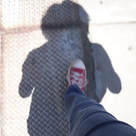 Sarah Kersey is a poet, musician, and x-ray tech from New Jersey, USA. Her work has appeared in Verse Magazine, Thistle Magazine, Columbia Journal (online), and other publications. “Michael” It’s the kind of blood-borne wish that meddles with loss I want a little of me in a faraway brother Like my estranged sister has all of me, a toss- away grief that will not decay or rot. My tears are bitter, but I want to be better. I need to pour over him the love I wrought Out of the reassuring squeeze of a letter Confirming paternity, shed tears over missed years, Newly drying sheets of a bed wetter. He is my younger self, Having a glow that some young men possess Yet choose to forget the compliments they felt… so down to earth. At my sister’s death, it will be ever more apparent That decomposition took its foothold above ground The worms would just finish her off transparent. Our youth dethrones us too soon. We’ve wound Up with an aging sensibility. I won’t let that happen to him; though dumbfounded, Betrayed by a new moon Not casting its brightest light. Dismayed when day looms. Once, my sister drove the two of us home From the Residence Inn After a seven month tome. No longer displaced my legs Splayed out on her dashboard like a spider Protecting its space and its baby eggs. Now I will be the protector of his space. I will poison the scorned queens, Court jesters, and benign neglectors that would erase his worth. My will is sheer as silk. My ties are the dependent clauses of a web. I am not an easy split. None of this will ebb the shock, I know that it will follow him to bed tonight. And when I go to sleep on my mattress’ slight Dip down from where my lumbar spine should begin I recall my sister’s mattress might not have been flipped in over two years, her firmness fetters Her humanity. I am across The room where a sinner pays a debtor But they’re both broke. If I could take her to the mat, Wrestle her back into my life again, have my forgiveness resound as a throbbing heart after combat Frozen and thawed to the limit In my longing for a younger brother Stamping a staple thread Edits in pen still fuming mother Beseeching God that no more court motions by father. I know he fled to him to hide him Hardly farther Than responsibility could ripple. He tracked muddy judgments and cowardly ways. I am brittle For paternity to churn the little left of civil. “Tears on the Floor” I watched my mother cry so heavily, not as drops of blood before sacrificing herself, but so her tears hit the floor, one salty tip at a time. One feeble foot glided a sheet of quilted Bounty over placid tile. Through tired teeth and wrung tongue in her mouth, she said tears on the floor could be a poem, and she knows poems don't have to rhyme because her two children don’t. She is no more of a poet than a totem pole portending doom to its sculpture, since pupils can predict an apoplectic future. Her bosom sucked children that nursed a grudge and grew like hunger baring distended cores which can't be discarded. Tears on the floor are due drops in mourning grilling the sun with an agnostic reflection. Years from where they’ve been, her children still remember the straits of being anxious coiled springs corkscrewing a smile right down to the studs. Holes in their long bones, decay in their vertebrae; What can be said of a crumbling constitution? A sinking second floor? A leaky pitched roof? An arsenal of weapons such as a phallic switchblade affixed to the hand, detaching, removing? An astigmatic omnipotence? What cannot be seen is slipping strength dissolved into tears…on the floor…and no one will fall on their account. Tears---on the floor---are frenetically bloating to preserve life, shedding and abandoning a sinking ship. Our mother prides herself on our home’s dry basement. French drains frame the perimeter and sip on my errant tears. Drops meddle, fester, and muddy beneath the foundation. Then, they evaporate, condense, precipitate a violent fall that shakes the totem pole from sleep. Even if gravity exerts its gratuitous influence, what a way for a swimming pool to suspend fear; what newborn bravery. “On the Only Island” (When listening to “Sumiglia” by A Filetta) In Corsica, “Sumiglia” is personality. A Filetta is a fern. Flickering taut cords timid strides shy vibratos and vocal strokes squinting with the lilt of morning. I want my people live I want them fervent and rising I want them conjuring colors like a blind infinity inside a muted trumpet. Floating mercury, listing regaining balance from counter-lean, one foot basking while treading its shadow, the other insubordinate foot trades love for indifference. Men sing paghjella, a polyphony propre, their own… I want my people rich in their poverty, identifiable in their assimilation. It’s a sore mouth, lacerated tongue splitting sound reasoning through conflicting accents. A fleck’s odyssey away from l’ile seul, an only island. Your command in familiarity with custom color, yours and mine. My hope for us, the color of dusk of midnight of well-watered clay of off keys and whole rests is raised organized voices. You are not silenced when hand is over ear like a shell of another time. 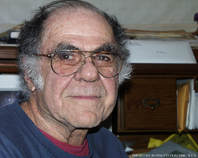 Simon Perchik is an attorney whose poems have appeared in Partisan Review, Forge, Poetry, Osiris, The New Yorker and elsewhere. His most recent collection is The B Poems published by Poets Wear Prada, 2016. For more information, including free e-books, his essay titled “Magic, Illusion and Other Realities” please visit his website at www.simonperchik.com. *
These gravestones are shaped the way every avalanche wants to enter the Earth –first as a single doorstep then the rush though the rocks you listen for are already moons helping you find the door for holding on while the light under you becomes another shadow made from wood lays down as a room that cannot change its mind is filled with cracked lips, the cold and end over end the strong corners, the kisses that made it here. * For a few hours every night the floor slows and the room cuts back quieted, begins its descent the way a dead lake is filled with shoreline –the rug is used to boards that stay wet though it’s an iron bed breaking in half where a pillow once filled with seabirds still clings to the other side before it opens –it takes time but the floor has to be washed every night just to hear the dress touching down, folding over the mop the rotting wooden handle. * Your face is covered with paper now held in place by its words for sky and wind –a simple love note can keep the rain away let you read forever in the dark though it tastes from the salt still on your lips –all those years soaking up this hillside till nothing was left to open except over your cheeks you have all the air you need in the corners not yet grass. * You sleep with the coat buttoned and though your eyes are closing the sleeves cling by listening sure her favorite dress is somewhere in this room no longer morning, named as if these walls once were stone and what you hear is losing speed, altitude –the bed knows all about how an underground cave stays open, kept trapped to survive as a whisper not a whisper anymore. * You wait at a fence though the yard no longer moves –all this air and not one mouthful for these dead left in the open where each leaf is handed over as the loss that was the one too many and from the same gate, half wood half kept open as those slow climbing turns that never make it back, forget how to fall from moonlight, make room for more wood and these dead feeling their way down hand over hand. Don Mager’s chapbooks and volumes are To Track The Wounded one, Glosses, That Which is Owed to Death, Borderings, Good Turns, The Elegance of the Ungraspable, Birth Daybook, Drive Time, Russian Riffs. He is retired and was Mott University Professor of English at Johnson C. Smith University where is also served as Dean of the College of Arts and letters. As well as a number of scholarly articles, he has published over 200 poems and translations from German, Czech and Russian. In the 1970s he published articles and review on Gay Liberation. He lives in Charlotte, NC with his partner of 36 years. They have three sons and two granddaughters. Us Four Plus Four (New Orleans University Press) is an anthology of translations from eight major Soviet-era Russian poets. It is unique because the tracks almost half a century of their careers by simply placing the poems each wrote to one of more of the others in chronological order. The 85 poems document one of the most fascinating conversations in poems produced by any group of poets in any language or time period. From poems of infatuation and admiration to anger and grief and finally deep tribute, this anthology with its preface by Richard Howard invites readers into the unfolding of such inimitable creative forces as Anna Akhmatova, Boris Pasternak, Marina Tsvetaeva and Osip Mandel’shtam. February Journal: Tuesday, February 5, 2013 Sly with ice, beneath satin shrouds, the predawn roads lurk. They want sun to lie low. They want clouds to hug thick mittens across the tops of trees. They want fog to blow egg-white froth into squinting eyes of headlights. Dustings of powdered sugar sweeten sidewalk treacheries. Hardened glazes seal cold inside locked car doors and keyholes. When dawn’s small gray pokes out to sniff the air before its caution creeps from the horizon, roads, sidewalks, blind lights and key slots, frozen in time and poised to snap, join forces conspiring to hide skids, spins and falls. May Journal: ∞∞ Saturday, May 11, 2013 The sparse grass pad of dirt sips just the right amount of warmth. When the moment’s ripe, it coughs up low flying Miner Bees from sieve-like pencil holes. They are old friends come back to visit, so ropes of gold Lady Banks’ roses call to their gold tufted manes: come cuddle with us and drift on our waves of afternoon stupor. Sunlight sprinkles swirls of gold midges in mist sprays above their heads. It looks deeply through the greening trees to the west horizon and decides for now in the goodness of good time their rendezvous must wait awhile—still. September Journal: Friday, September 27, 2013 Yellow Jackets zoom vertically from their hole. Gold glints on shafts of sun are their sole presence to consciousness. Wide enough for a paw to reach down, the hole gapes black. The mower rumbles past on its drive shaft. Swaths of leaf mulch stuff its new white bag. It watches for frogs to dive for the creek. It sees no fight in their flight. A mandible clamps down on the glove. Its stinger drills to the knuckle. Another grabs the shirt and stabs the neck. Skin behind the knee takes a hit. The mower dives up the fresh mown hill through the back gate. It too is flight. November Journal: Saturday, November 2, 2013 Yellow’s bullish herds of grandeur tramp through china closets of Willow Oaks and Sycamores. They trample the hems of the wind’s skittish chill-gusting skirts. They spin like giant mythic butterflies flocking for their mythic southbound flights. Beneath Hickories and Sweetgums, they drift in billows for puppies to pounce and roll in. The deck view looks away and looking back, well, here, in flapping sheets like a sail, it is, face to face, yellow. Yellow clips a shoulder, and like a canary swooping down with tiny claws, yellow nests in the hair. 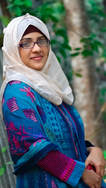 Laboni Saif, lives in Dhaka, Bangladesh. She has completed graduation on English Literature. She loves poetry and books and sometimes write poem and article . In leisure she likes to read books and spend lovely time with her family. Her poems have been published in Tuck magazine, Inventives magazine, and in an anthology. Her articles have been published in Tuck magazine and Women Chapter English. The Waiting Room In the waiting room of school, Gossips are on its high. Women engaged in domestic topics, Men's topics are political. Kids are on the classroom, Learning new lessons. In the waiting room of school, I am sitting in a corner, Holding an old newspaper in hand, Looking at the pages with oscitation, Listening their gossip with attention. Although wanting with heart and soul To join them in gossip. Because, I know how once, They were mesmerized with my words! Well, its enough, I can nomore hold back I stood up from the chair And walked toward them Nobody is noticing me As if I am being unsighted. Being a little surprised, I halt in their middle With a raised voice I greeted them all But nobody is giving any reply ! As I am thinking about the reason I heard one of them is regretting About my sudden demise. With a big sigh, I left the waiting room of school Before leaving I went to the classroom, Where kids are busy with their task Among them, one is my own part Though she is not noticing me I am standng on her back. With a heart rending cry I threw a question toward heaven Why so cruel the creator is, That He set me apart? Goodbye the waiting room, I will never be back. Endless waiting In the fear of losing eyesight, looking at your ways--unwinking. For the thirst of eyes shall not be met in one lifetime, or a few lifetimes. To stare at your eyes, a millennium is so short a time. Legs are getting motionless! Well, I don't much care. For the heart is still soggy As it showers rain every now and then. I might be getting older, yet feelings are the same, same is the passion. Turn up for once and see, How I welcome you, how I embrace with the warmth of my passionate love.  Born in India in 1981, Alok Mishra is a teacher and an award winning poet. He has had a keen interest in writing poems since a very young age. His poems have been published in several national and international magazines and global anthologies - Voices of Humanity Vol.4, O Sweetest Love: A Timeless Treasure, Creative Corner: Crafting Emotions, Dreams Anthology, Anthology of poems On Autism Awareness, etc. His poems are centered on love and life. He likes to write spiritual and romantic poems. Heavenly Rain Tiny drops of heavenly rain, Contacting our bodies with cool touch Make my sensations shivered And your bodice adhered to your beautiful breasts. In the light icy shower, I forget all, Hugging your palpitating bosom Whose warm touch relaxes my emotions. ©® Alok Mishra River From the top of the mountain A river descends upon the earth; As a white feathered fairy comes from heaven; Jubilant in the nature from the birth. Waves gladly dance in sun light, While it flows on the ground; As if a number of mermaids bright Shake their half clothed limbs with anklets’ sound. When its icy cold water Embraces my naked hot frame, Become my miseries sans power; And no other mirth do I claim. Towards the great ocean deep, It flows day and night; Resolution in the heart does it keep To mingle with the infinite. ©® Alok Mishra Our Union In another world, Where no worries find place, I will take your sweet memories on me, Beautiful spring will come after long winter when the cruel fog lifts. I am certain that my tearful sobs will get response from your side. When all the mourning stars With deeply sad moon are captured In the pathetic oceanic web, Definite, clear and eternal will our union be, I am sure. You, my love, take me not as a dreamer; Our life will be real in the new world, It is my assurance!!! ©® Alok Mishra 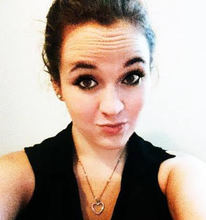 Mackenzie K. Wertman is currently a student at Full Sail University pursuing her bachelor’s degree for Creative Writing for Entertainment. Wertman is a full-time student focusing on her education and the betterment of her writing abilities. She has some prior set experience and has worked as an intern at Haven Entertainment in Los Angeles, California. During high school, she was an active member of her community and President of Students Against Destructive Decisions (SADD). In her spare time, Mackenzie is an avid animal rescuer and enjoys watching her favorite movies. ([email protected]) The Candle Light Inn Room 207 at the Candle Light Inn was small and outdated. The room was freshly cleaned, but still unlike any Quality Inn. The shag carpet smelled of smoke and alcohol, mixing with the room’s overall scent of sex. The striped bedding was rough, dingy, and matched perfectly to the piss-colored wallpaper that was plastered around the room. The old-fashioned lamps that hung just above the beds hardly lit the compact bedroom, the only true source of light shinning from the open patio glass door in the corner of the room. Olivia waited just within the doorway, her hand stroking the hideous yellow wall with a small sigh. “Another weekend gone,” she said, taking a step out into the small patio area as she joined Christopher at the table. She sat down on a shitty lawn chair straight across from him before she took a quick swig of her gin and smiled. “It was a fun… business trip.” Christopher simply nodded, his eyes glazing over as he played with the ring on his finger. There was red lipstick speckled across his face and neck, a color that matched the plump cherry blossom lip shade of Olivia’s lips. “Year seven,” she said, her eyebrows rising as she took another drink. “How time flies.” “So it does.” Christopher cringed, his jaw locking and his fingers tightening around the piece of metal that he continued to twist around his finger. “Seven years...” Olivia nodded, a lone finger reaching up to pull at her bleach blonde hair. “Why don’t we celebrate again?” She moved her foot under the table, just far enough so that it brushed against Christopher’s shoe before her toes ran up the length of his calf. His eyes moved away from the ring for a moment, shaking his head and moving away from Olivia’s touch before this gaze returned to same wedding band. “Okay then…” Olivia said, her foot moving to its proper location. She rose the glass to her lips and drank the rest of the gin down, her finger swiping away the lone drop that remained on her lips. “Have you heard from your wife?” Christopher let go of his ring, his face hardening. “No,” he said. He rose from the shitty plastic chair, walking into the room but not out of sight. At the small minibar he made himself a concoction of alcoholic liquids before joining Olivia back out on the cement patio. “I think she knows,” he said, his voice barely above a whisper. “She has to know.” “Chris…” she said. “We talked about this.” “Yeah, but have you heard from Derek?” “Yes.” Olivia nodded, raising from the table and walking into the doorway. “Don’t worry! They’re both still clueless, as always. ” “Olivia…” he said, following her into the room. “We can’t do this anymore.” Olivia rolled her eyes, falling back onto the lumpy mattress. “Here it comes,” she said. “I could tell this one was coming.” “Cut the shit,” Christopher said. He ran his hand through his hair, his face breaking as he threw his empty class at the concrete outside the door. It shattered, pieces flying both inside the room and across the patio. “I’m serious! We can’t do this anymore. This was the last time. I love my wife. I love Alexis, and you love your husband.” Olivia pushed herself into a sitting position on the bed, her face twisting and her fingers tightening over the fabric of the bedding. “You say that every year,” she said, raising an eyebrow. “And yet every year you still show up. We both do, because deep down we both know the truth. I don’t love him. You don’t love her. I have never loved Derek. I love you. I love you and this shitty hotel room.” Christopher shook his head, looking at the outdated room and the decoration of shattered glass. “You love anything that is damaged.” He walked passed her and towards the mirror that stood just to her left. He paused before it, taking in his appearance for a moment before fixing himself into place. Christopher wiped away the makeup from his skin, tightened his tie, and soothed his hair. He turned to Olivia looking very much like the confident man that had entered Friday night, his shoulders locked and his face hard, his wedding ring in perfect view. “Goodbye, Olivia,” he said. “I hope I never see you again.” Olivia smiled, standing from the bed and moving across the room. “Bye, baby,” she said. She kissed him softly against his lips, running her hand down his chest and placing the key to Room 207 into his shirt pocket. “I’ll see you next year.” Amanda Brauchler is a literature student from New York who aims to use poetry as a means of trying to make some sort of sense of the human condition. To Be Loved By A God Holy hands touch sin-soaked skin, lay flat on lovers backs. as They smile sun shines from behind Their lips. The mortal boy hums happily into bedsheets. To be loved by a God means to be loved By something much larger than you can ever imagine; More completely, more selflessly, more complexly And a little more harshly. Deities have no need for labels of gender or sexual identity. They do not understand, at first, why Their lover is scared to hold Their hand in public. Gods try not to get angry when Their lovers shy away from Their touch. Instead, They get angry at the others who dare to use Their names to speak on things they do not understand. To be loved by a God means to be loved more than you have words to explain. They will laugh at your inability to fill the gaps of your language. There are some things you just don’t need to say. On the days that you don’t feel beautiful They will paint portraits on your skin with Their lips. For the first time in your life you will realize your worth. Everything that you have ever hated about yourself will become an offering to Them at your bedroom altar. To be loved by a God means knowing They will leave. They must. What business does a God have spending time with a withering mortal? But mortals will always wait naively by an open door with fond smiles on their faces as they tell young people about a kind of love that makes you believe that you are something divine. Cream and Sugar I met Jesus in a coffee shop. I sat down across from him and smiled. “Do you take your coffee black?” I asked, trying to make polite conversation. “No, I need a lot of cream and sugar,” he said as if he had said it a million times before. “I don’t know why that surprises me,” I said. “Because you think my Father and I are bitter. They all do,” he said. “I don’t,” I said, “I never did.” He smiled. “That’s a first. Do you have any questions? People always want to ask me questions.” “If you wouldn’t mind,” I said, “I don’t want to interrupt your coffee or intrude. Mostly I wanted to say hello.” He shook his head with a large smile. “No, I don’t mind at all. I love to meet new people,” he said. “But we are not strangers,” I said, “I have known you my whole life. I am sure you’re the first person I ever knew.” He laughed, fully, with his entire body. “You make a good point. In that case, you really shouldn’t be afraid to ask me anything,” he said. “You make a good point,” I said. “Why do people think you and your Father hate people like me?” He sighed and took a long drink of his coffee. “That’s a difficult question and I hope you know that it isn’t true. I thought I was so clear on how much I love everyone.” “I know,” I said, “I don’t blame you.” He smiled. “Are you a sinner?” he asked. “Of course,” I said, “But so were you. My sin does not erase all of my love.” He nodded. “You’re right, of course. Do you have any other questions for me?” “A million and one,” I said, “There is not enough time in the world to ask them all. Why did you die for us? Why weren’t you selfish? When your Father said you had to die, were you angry? Do you ever feel like you’re burning in your own skin, or is that just me? Do you weep for us when we make mistakes? Do you have days when you just can’t get out of bed too? I feel like I say ‘I’m sorry’ too much but can you please let me know I’m doing something right?” He leans over the table and kisses my forehead with a fading smile on his face. “You must be so sad. It’s me who should be sorry,” he says. “Sir?” the barista asks. I turned to look at her. “Who are you talking to?” she asked. “An old friend,” I said, mostly to myself. “I love you” and other declarations of war You sit next to me on the train close enough to look like friends far enough to not get strange looks and you lean over to whisper in my ear you look so nice today. I hiss back we can’t afford your blasphemy. You just laugh. You have always been less careful than I. At a coffee shop when we’re sat across the table from each other our hands reach for sugar and yours lingers just a little too long next to mine and I want to smack the smile off of your face you don’t know what you are risking here this is your first time out in the open you have never known what it is to be hated for your love. Being with you is knowing that any moment could be our last and you are not careful enough with that knowledge. you hold hands with reckless abandon kiss without care while I make sure to check over our shoulders I am starting to resent being the bodyguard for everything we are. At home when we are finally alone you smile and press kisses into my collarbone and you whisper I love you and I whisper don’t say things like that. and I wonder when you will stop finding novelty in our hiding place.  Ryan Quinn Flanagan is a Canadian-born author residing in Elliot Lake, Ontario, Canada with his other half and mounds of snow. His work can be found both in print and online in such places as: Evergreen Review, The New York Quarterly, Anitgonish Review, CV2, Scarlet Leaf Review, PRECIPICe, Existere, Windsor Review, Vallum, The Dalhousie Review, Red Fez, and The Oklahoma Review. 39 Ballerinas and a Cordless Drill gradations in the patchwork my weeping crop duster eyes and they formed a circle without a word deep in the woods graceful as walking sticks: 39 ballerinas and a cordless drill, and the way they danced around the drill you could tell it was a very special drill, kicking their legs high in the air like nylon rockets with hips for thrusters that no man would ever see. Well Hung His mother had this giant chandelier hanging in what I guess they would call the family room nowadays in the front of the house with a large bay window surrounded by chairs so uncomfortable no one would ever sit in them and a couch wrapped in plastic so that even the most adventurous of posteriors would slide right down onto waiting white carpet and I remember opening those books on slavery for a school project and seeing those pictures of the lynchings in the American south and how he looked at the pictures then up to the chandelier and saw the same thing I did and how we never spoke about it or sat in that room again even though there were many sleeping bag sleepovers where you eat too much and sleep too little watching horror movies until sunup where nothing goes well for anyone. Behind the Science Getting up from the chesterfield I walk across the room and look behind the science. The science is constructed of paint and plaster, divides the rooms of a house from one another. But things are fluid: the motion and the shift. Everything changing like a fresh pair of socks. Now I am the science and you are behind me. Pulling at my pigtails from a past life. |
Categories
All
|
 RSS Feed
RSS Feed